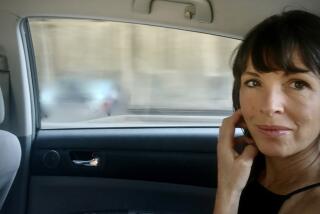For Ellen Willis, criticism was personal
My favorite Ellen Willis piece is “Next Year in Jerusalem.” Originally published in Rolling Stone in 1977, it’s a tour de force, a critic’s re-imagining of autobiography. In it, Willis describes an extended visit to Israel, where her younger brother Mike has fallen under the sway of an Orthodox rabbi “dedicated to bringing real Judaism to backsliding Jews.” Willis, who has always been close with her brother, heads for Jerusalem with the intention of bringing him home.
Or does she? The power of the essay lies in this conundrum, in the tension between the practical and the spiritual. Willis — the onetime New Yorker rock critic and Village Voice editor and columnist who went on to found the Cultural Reporting and Criticism program at NYU and was, by the mid-1970s, deep into a shift from arts to political and social commentary — is, in many ways, a perfect guide: first-generation feminist, meticulous in her intellectualism and yet drawn to the idea that there must be more to existence, to the universe, than what we see.
“On acid,” she writes, “I had, as Mike observed, experienced the something that Westerners have commonly called ‘God’ — the source of all truth, beauty, goodness.” Willis, in other words, is my kind of acid head — less interested in getting high, per se, than coming face-to-face with God.
“Next Year in Jerusalem” is a cornerstone of “The Essential Ellen Willis” (University of Minnesota Press: 512 pp., $24.95 paper), which is the second collection put together by her daughter, Nona Willis Aronowitz since the author’s death in 2006. Here, we find more than 50 essays drawn from across her career, beginning with her early years as a rock writer, then moving fluidly into her cultural and political work.
Willis was always a voice of liberation: This is the through line, no matter what she was writing about. She was also personal in the most transformative sense — not self-indulgent, but rather rigorous. Her criticism arises from her thinking, her experience; it is representative of a larger point-of-view. When, late in the collection, she addresses Susan Sontag’s death from cancer through the filter of her own cancer diagnosis, it is a classic Willis move.
“When clichés (that is, stale metaphors) about the precariousness of life suddenly present themselves as nothing less than the simple compelling truth,” she writes, “it concentrates the mind.” She is using Sontag, then, to take a stand against metaphor, zeroing in on “a somber silence, befitting the author’s funeral; for death is truly the kingdom where metaphors come to an end.”
That’s what makes “Next Year in Jerusalem” so brilliant: the way Willis reveals herself through her material. She is tempted by the assurances of Mike’s rabbi — but ultimately, can’t set aside her hard-earned feminism, her belief in rational inquiry as the cornerstone of a committed life.
At the same time, she admits to longing: “I was too much the product of Western libertarian values,” she tells us, “to travel the rebbetzin’s route to self-acceptance, and so far I had not succeeded in finding my own …” It’s the essential conflict at the center of her writing — between thought and feeling, expression and emotion, engagement and ecstasy, the problem of experience.
As to why this matters, in the first place it’s exhilarating. Reading Willis is to watch her think, to discover, on the page. Her writing is an exploration, in which she surprises herself as much as she does us. Equally important, it’s an argument for critical thinking, for the back-and-forth of distance and interaction, the necessary double vision that allows us to reflect and comment on what we see.
The importance of this cannot be overstated: Her work only remains relevant to the extent that she lets us see her in the text. This is why her posthumous collection of rock criticism, “From Out of the Vinyl Deeps,” was so consuming when it came out in 2011 — not because we were reading about 45-year-old bands and records but because the real subject was Willis’ mind.
This is a subject of concern to any critic (or writer or reader): how work remains relevant when it is by its nature ephemeral. All of us try to capture a moment, but the moment dissipates even before we are finished setting it down. How, then, do we produce work that lingers? How, then, does anything last?
Aronowitz seeks to address this by enlisting a quintet of younger critics (Sara Marcus, Irin Carmon, Ann Friedman, Cord Jefferson and Spencer Ackerman) to introduce the five main sections of the book. It’s a fine idea, meant to showcase her mother’s continued relevance, but in the end, the real showcase is the work itself.
After all, in “The Essential Ellen Willis,” as she did throughout her writing life, Willis offers the only answer that makes sense. “Tyranny is joyless,” she declares. “Freedom is pleasurable. Liberation from tyranny is ecstatic. Pleasure, joy, ecstasy — all are forms of the erotic, which is to say the delight in one’s bodily, sensory being takes in freely moving forward, plunging into, engulfing the world.”
More to Read
Sign up for our Book Club newsletter
Get the latest news, events and more from the Los Angeles Times Book Club, and help us get L.A. reading and talking.
You may occasionally receive promotional content from the Los Angeles Times.








